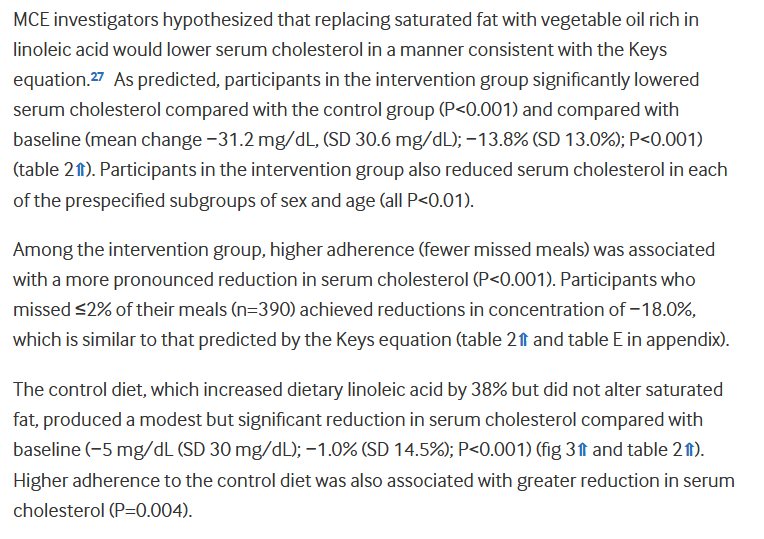To be fair, those older studies are likely to have replaced saturated fat with margarine high in trans fat. Even mainstream nutritional epidemiologists now acknowledge that trans fat is more harmful to the cardiovascular system than saturated fat.
Is it possible to be on keto and not have high cholesterol?
From the study:
Because the trans fatty acid contents of MCE study diets are not available, one could speculate that the lack of benefit in the intervention group was because of increased consumption of trans fat. Indeed, in addition to liquid corn oil the intervention diet also contained a serum cholesterol lowering soft corn oil polyunsaturated margarine, which likely contained some trans fat. The MCE principal investigator (Ivan Frantz) and co-principal investigator (Ancel Keys), however, were well aware of the cholesterol raising effects of trans fat prior to initiating the MCE.77 Moreover, Frantz and Keys previously devised the diets used in the institutional arm of the National Diet Heart Feasibility Study (NDHS), which achieved the greatest reductions in serum cholesterol of all NDHS study sites.2 Hence, it is highly likely that this experienced MCE team selected products containing as little trans fat as possible to maximize the achieved degree of cholesterol lowering. Perhaps more importantly, it is clear from the MCE grant proposal that common margarines and shortenings (major sources of trans fat) were important components of the baseline hospital diets and the control diet (but not the intervention diet). Thus, confounding by dietary trans fat is an exceedingly unlikely explanation for the lack of benefit of the intervention diet.
This illustrates another problem with attempting to study transfats, particularly with respect to epidemiological studies. Into what foods are transfats placed? It’s a lot of the high carb, highly processed foods.
Is it people who eat those foods or the transfats that are the issue?
I know this was an RCT, but compare what I show above with these results:
In two WEEKs, I can show a reduction of 32 in total cholesterol, and it likely has nothing to do with PUFAs, since I try to avoid these.
I realize that this is supposed to track diet, but once you know how variable these values are, you have to wonder. Consider this:
For those who missed meals, maybe their TC was higher due to their drawing more from their fat stores? That is, the people who ate more had more energy from outside sources, leading to a decrease in their TC.
This is a plausible explanation that has nothing to do with the amount of PUFAs they ate.
That is interesting. I can think of a couple of plausible explanations for that, but they don’t seem to hold up that well under closer examination. Hmm! You have any studies you could handily link to? (Don’t worry about it, if you don’t.)


